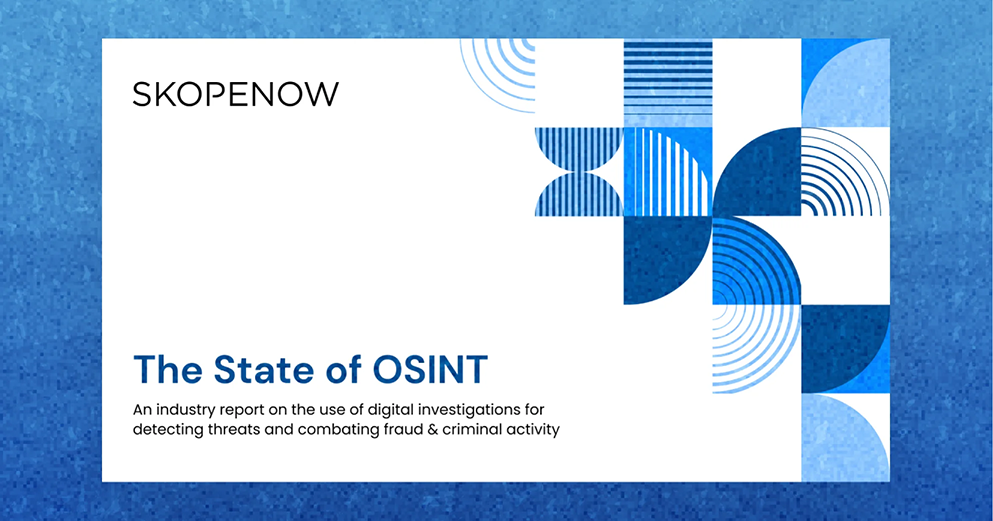August 09, 2023
The Rising Threat of State-Sponsored Organized Crime

Steve Adams
Product Marketing Manager
In a world where the lines between organized crime and state actions are increasingly blurred, the comments of Graeme Biggar, Director General of the UK's National Crime Agency, offer a stark illumination of the evolving threat landscape.
Biggar's recent speech highlighted the escalating symbiosis between organized crime groups and hostile states such as Russia, China, North Korea, and Iran. This once transactional relationship, primarily a tool for financial gain, has morphed into a potent mechanism for geopolitical manipulation. In this blog, we'll explore these emerging links, tracing their evolution and emphasizing the vital role of law enforcement and government agencies in managing these threats.
The Evolving Tactics of Hostile States
Publicly available intelligence and news reports provide compelling evidence that organized criminal groups have collaborated with governments for a significant period, a partnership that benefits both parties. A review of Biggar's remarks during the National Crime Agency's 2023 National Strategic Assessment reveals the growing ties between organized crime and hostile states, underscoring that this is not a new issue but one that is intensifying:
"North Korea has for some time used cybercrime to steal funds and more recently cryptocurrency."
Biggar's first example of cooperation indicates that North Korea's regime has leveraged its ties with organized crime groups to circumvent international sanctions, launder money, and finance illicit activities. The United Nations reported that North Korea stole between $630 million and $1 billion in cryptocurrency assets in 2022, with some of these stolen funds allegedly funneled directly into North Korea's sanctioned nuclear and missile programs. This example demonstrates the resourcefulness of hostile states like North Korea in exploiting global financial system vulnerabilities to their advantage.
"The Russian state has long tolerated and occasionally tasked the cybercrime groups on its territory and had links with its oligarchs and their enablers."
Similarly, Biggar's second example suggests that the criminal underworld and the political elite have been intertwined for decades, with criminals often acting as agents of the government's authority in Russia. Russia is known for tolerating and occasionally employing cybercrime groups operating within its borders. This symbiotic relationship allows Russia to achieve its geopolitical objectives while maintaining plausible deniability.
Last year, the Cybersecurity and Infrastructure Security Agency (CISA) warned of threats to critical infrastructure from Russian state-sponsored criminal groups conducting cybercrime. CISA disclosed that their intelligence indicated the Russian government was considering options for potential further cyberattacks, having already sponsored distributed denial-of-service (DDoS) attacks and the deployment of destructive malware against the Ukrainian government.
"But over the last year, we have begun to see hostile states beginning to use organized crime groups - not always of the same nationality – as proxies."
The final relevant portion of Biggar's comments clarified that UK government agencies found strong evidence that hostile nationals are employing organized crime groups as proxies to further their agendas, even paying criminals in the UK to cause disruption and potentially target individuals they cannot easily reach with their operatives. The UK is likely not the sole target of this emerging collaboration, and the US is also under threat.
The Role of Domestic Law Enforcement and Government Agencies
Law enforcement and government agencies already grapple with monitoring and mitigating threats posed independently by organized crime groups and hostile states. When these threat actors converge, the potential impact they can cause is amplified. The common challenges for organized crime groups, such as securing political influence and sufficient finances, and those for hostile nations, like securing reliable assets on the ground, can be mitigated when they collaborate, leveraging the other party's strengths.
To counter the heightened threat from an organized crime group bolstered by government power and finances, law enforcement and government agencies must collaborate, merging traditional law enforcement methods with advanced technological capabilities. Automated Open-Source Intelligence (OSINT) tools like Skopenow enable investigators to identify and scrutinize criminal activity in real time, build court-ready intelligence reports on bad actors, and uncover the links connecting individuals in organized crime groups and hostile states.
Enhancing OSINT Capabilities
To identify organized crime groups operating in foreign nations, hostile governments either need to establish relationships with a local faction of a major transnational organized crime group or make contact over the internet with members of organized crime groups active in their target nation. News reports of gang activity and arrests often spotlight local crime groups and their members, providing hostile nations with the personal identifying information they need to find gang members online and communicate with them. One way to investigate this online contact is by utilizing OSINT, such as monitoring new connections to identify suspicious accounts.
To effectively determine which organized crime groups are backed by hostile nations and monitor the increased threat they pose, law enforcement and government agencies must invest in developing and enhancing their OSINT capabilities. This can be achieved through the following measures:
- Training and Education: Agencies should invest in specialized training to equip investigators with the legal and ethical knowledge and practical techniques required to generate OSINT from publicly available data across the internet effectively. It is crucial that learning is not considered a one-off event but that a culture of continuous professional development is adopted due to the constantly evolving nature of OSINT investigations.
- Technological Advancements: Turning public data into evidence without the power of AI results in labor-intensive, time-consuming operations that take officers off the street and risk evidential inadmissibility. However, by leveraging solutions like Skopenow with advanced artificial intelligence for OSINT, law enforcement and government agencies can automate the collection and analysis of vast amounts of relevant data from various sources. These technologies generate accurate, timely insights that expedite and efficiently clarify cases.
Upgrading OSINT Capabilities with an Automated Solution
The emerging connections between organized crime and hostile states significantly threaten national security, economic stability, and public safety. Collaborating with criminal entities allows hostile states to achieve their objectives while evading direct attribution and consequences. To effectively counter this evolving threat, domestic law enforcement and government agencies must prioritize enhancing their OSINT capabilities, focusing on social listening, situational awareness, people and business investigations, and link analysis.
Only by recognizing and harnessing the power of OSINT can government agencies identify emerging threats from hostile government-backed organized crime groups and expose hidden connections to piece together the data trail that links them. With an automated OSINT solution, law enforcement and government agencies can stay ahead of hostile state-backed organized crime groups and safeguard national interests against them. Over 50 law enforcement and government agencies trust Skopenow to enhance their decision-making by delivering actionable, timely, and relevant OSINT.
At Skopenow, we understand the importance of staying up-to-date on the latest developments, trends, and techniques in OSINT. Our solutions empower organizations to gather and analyze open-source information more effectively and efficiently, identify trends and patterns in the data, uncover hidden connections, and detect emerging threats and risks. Start unlocking the power of open-source intelligence with a free trial today: www.skopenow.com/try.


